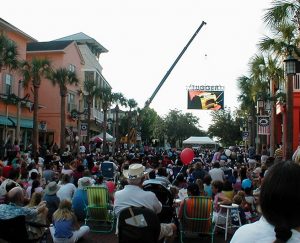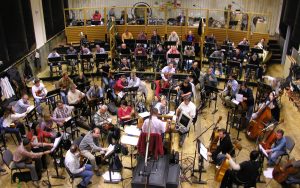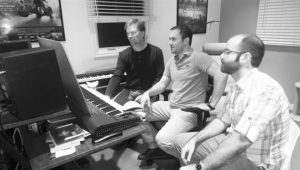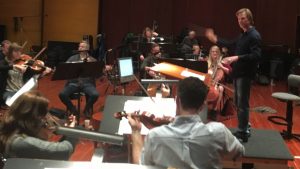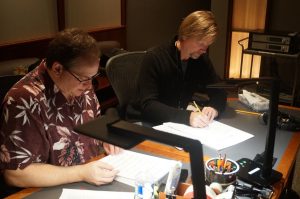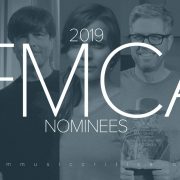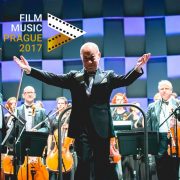Greg Sims – Interview
The documentary John G. Avildsen: King of Underdogs, directed by Derek Wayne Johnson, will premiere next Saturday, February 4th – 7:00 p.m., at the Santa Barbara International Film Festival (California), telling the story behind classic movies like Rocky and Karate Kid, that emerged from the hand of John G. Avildsen. The premiere will have the presence of director John G. Avildsen, and actor Ralph Macchio (Karate Kid).
American composer Greg Sims, born in Tennessee but currently based in Los Angeles (California), has been in charge of scoring the documentary. Gorka Oteiza (SoundTrackFest) had the opportunity to meet Greg Sims last year in Los Angeles, and that lead to the following interview, that you can read below.
INTERVIEW
Thank you very much for taking the time to do this interview for SoundTrackFest. The truth is that since we spoke in September last year about your projects and the possibility of publishing an interview, some months have passed, right?
Yes, they have. And things can move along very quickly here in L.A. (laughs)
Well, then without further delay, let’s do it! First thing Greg, let’s talk about your origins. What are your earliest musical memories? What was the moment when you decided, “This I what like. This is what I want to do. I want to write music for the movies.” Or was it a more progressive transition process?
I have vivid memories of playing my toy piano at around 3 years old and wishing it had more keys. I began piano lessons at age five. I listened to music a lot when I was very young. Even though I grew up in a small town, I was involved in a church with a fine music program. I was fearless, too. At age 8, I remember playing the organ during a service with my feet dangling above the pedals! My mother took me to my first orchestra concert about that time, and it struck me as being the most wonderful thing I had ever heard. Fast forward to the release of Star Wars, when I determined that the job of film composer must be the best job in the world. But at that time, John Williams’ score was so above and beyond anything that I could even grasp, I couldn’t imagine how a person could reach that level.
You are originally from Nashville (Tennessee), but after passing through Orlando (Florida), you have finished in Los Angeles (like many other film music composers). Tell us about your beginnings in Nashville, world capital of Country music, and how you got to Los Angeles.
 I tell people I am from Nashville because I know they won’t know where Kingsport is. (laughs) My hometown is a five hour drive from Nashville, so Country music was a universe away really, and had little influence on my upbringing. After college and an extended cruise ship gig, my wife and I moved to Orlando for a couple of reasons. One, we knew there were hundreds of hotels and opportunities for piano gigs, and two, Orlando was being touted at the time as Hollywood East. I thought I would be able to avoid moving to Hollywood 2,000 miles from my family, so the move to Orlando seemed like a perfect fit for both of us. I did a lot of commercial work there so it was a good training ground for me. I also became involved with the Orlando Philharmonic and wrote countless arrangements for both live concerts and recordings. I became involved with the production of several music libraries, and through a friend, landed a gig composing and producing music for The Oprah Winfrey Show. My wife landed a record deal with a Country music label in Nashville and since by then we felt Orlando had run its course for us, we moved to Nashville which felt like coming home. Seven years later, I realized that Nashville was not the place to be a film composer unless I adopted the 200-year plan, so we came out to L.A. to see if it was a fit for us. Six months after that, we decided to sell our house in Nashville and have been here ever since.
I tell people I am from Nashville because I know they won’t know where Kingsport is. (laughs) My hometown is a five hour drive from Nashville, so Country music was a universe away really, and had little influence on my upbringing. After college and an extended cruise ship gig, my wife and I moved to Orlando for a couple of reasons. One, we knew there were hundreds of hotels and opportunities for piano gigs, and two, Orlando was being touted at the time as Hollywood East. I thought I would be able to avoid moving to Hollywood 2,000 miles from my family, so the move to Orlando seemed like a perfect fit for both of us. I did a lot of commercial work there so it was a good training ground for me. I also became involved with the Orlando Philharmonic and wrote countless arrangements for both live concerts and recordings. I became involved with the production of several music libraries, and through a friend, landed a gig composing and producing music for The Oprah Winfrey Show. My wife landed a record deal with a Country music label in Nashville and since by then we felt Orlando had run its course for us, we moved to Nashville which felt like coming home. Seven years later, I realized that Nashville was not the place to be a film composer unless I adopted the 200-year plan, so we came out to L.A. to see if it was a fit for us. Six months after that, we decided to sell our house in Nashville and have been here ever since.
How many musical instruments do you play? Which one do you identify with? Does that instrument influence your style when it comes to composing?
After starting on piano, I picked up the violin, taking lessons and playing in the local youth orchestra and our church orchestra. I loved playing in the orchestra, but I was a terrible violinist! I fell in love with the alto saxophone around age 13 and became involved in my junior high band program. I excelled on saxophone, which garnered me a college scholarship, and I split my time between that and piano. I also took up the clarinet as a doubling instrument to get more work. These days, I only play piano and keyboards. I think I draw on all the experience of playing multiple instruments when composing, and it definitely helps being able to get around easily on the piano.
Your wife, Annie, is an actress and a country singer and you have collaborated together on multiple occasions. Tell us about how it is to collaborate with her, and how that musical relationship is linked to your personal relationship. Do you have any projects together planned at this time?
Annie and I are very close, and it was natural that we would collaborate. Most of our collaborations have involved writing songs and making records together with me as the producer and arranger and her as the artist. We have also toured the UK several times as a support act for Don Williams and Gene Pitney. Although we grew up less than an hour apart and went to the same college, we met on a cruise ship where I was the pianist and arranger for the show band and she was the piano bar entertainer. Since our move to L.A., she is also acting as my manager, helping me with marketing, networking and staying positive.
Let’s go back to film music. Your first soundtrack that had recognition was for the film “Tugger: The Jeep Who Wanted to Fly.” How did you get to that project? I understand you were not originally going to be the composer of the soundtrack, am I right?
I was living in Orlando at the time and my wife had a steady gig in a piano bar at one of the Disney World hotels, the Swan. Barry Temple, a character animator for Disney, would come to hear her perform on occasion. He told her about a startup animation studio in town that he was joining. Annie set up a meeting with Jeffrey, the owner. The meeting went well, I thought, and he was particularly keen on the fact that I was the Arranger-in-residence for the Orlando Philharmonic Orchestra because this is the sound he wanted for his movie. He scheduled a follow up meeting for me to meet the rest of the team, and when I arrived, Jeffrey said, “Hi Greg. I’d like you to meet Jeff S., the composer on the film.” I was introduced to the room as the orchestrator. Needless to say, this was not what I had expected, but I think I kept my composure pretty well considering! Long story short, Jeff never delivered on any cues and I became the composer.
And talking about the music, Tugger was an animated film for kids. Jim Belushi starred as the main character (Tugger the Jeep) and wrote a few songs for the film which I scored around. The fact that the film was for young audiences greatly affected my approach to the score. I love scoring animated films because as a composer, I can be over the top with the emotional impact of the music. You could never get away with this in a live action film. One of the scenes was pretty dark, so I was trying to be careful not to overplay it, but when I turned in the mocked up cue to the director for approval, he said, “It’s sad, but there’s still hope [in the music]. I want sad, with no hope.” We recorded the score with an orchestra in Manila, sad music and all. (laughs)
Let’s move on to another job of yours that is also well known; the soundtrack of “The Lion of Judah” Tell us about your arrival to the project, and the style that you decided to give to the music you composed for the movie.
We found out that Tugger had been picked up for distribution by another animation company and reached out to them to see if they needed any music. I ended up composing the score for Judah because the producers were dissatisfied with the original score. The original songs in the film were really strong, but the underscore wasn’t working like they had hoped. I re-produced the songs to bring them up to Hollywood standards, and our team got some top Christian artists to replace the vocals, including Kari Jobe. Because I had the songs first, I was able to compose the score in and out of the songs for what I hoped was a seamless soundtrack experience. I convinced the executive producer that the film called for an epic-sounding live orchestra score, so I wrote sweeping themes with an almost over-the-top dramatic approach. If I had to describe the style, think Ben Hur meets Chicken Run. (laughs) We recorded at Smecky Studios in Prague with James Fitzpatrick.
This soundtrack has been published by Mikael Carlsson at MovieScore Media. How is it working with Mikael Carlsson? How was the CD edition? Was there music left out? How was the selection made? Did you have to adapt music for the CD? (too many questions, maybe? *laughs*)
 Mikael was wonderful. Everything he did was first rate, from the packaging to the mastering. I sent him all 44 or so cues and he picked from those and combined a few and arranged the order. Because of his clout as a record label executive and founder of the IFMCA, the CD was reviewed by a number of film music critics including Daniel Schweiger at Film Music Magazine. (Or maybe it’s because Mikael is such a nice guy.) Anyway, I got a lot of good reviews which is always helpful.
Mikael was wonderful. Everything he did was first rate, from the packaging to the mastering. I sent him all 44 or so cues and he picked from those and combined a few and arranged the order. Because of his clout as a record label executive and founder of the IFMCA, the CD was reviewed by a number of film music critics including Daniel Schweiger at Film Music Magazine. (Or maybe it’s because Mikael is such a nice guy.) Anyway, I got a lot of good reviews which is always helpful.
Tell us about other projects you have worked on. Is there a project you keep special memories from? Why?
I guess I will always have special memories for Tugger since it was my first feature film score. The film company put on an incredible outdoor world premiere — a red carpet style experience at Celebration, Florida which included a massive screen suspended from a crane and a performance by Jim Belushi (the voice of Tugger) and his band The Sacred Hearts.
Is there any project that has been “in the shadows” that you would like to rescue for the public?
Yes. The most talented artist I know working in the film business, has a script for a sci-fi film that I would love to see produced and released. He already has all of the special FX animation completed and just needs funding to finish production. (He was also the champion on the inside who helped me land Judah). Prelude Pictures held the option for a year but dropped it to pursue other interests.
And now let’s talk about the main point of the interview. After almost 3 years of production, this February 4th is the premiere of the documentary “John G. Avildsen: King of the Underdogs” for which you composed the soundtrack. A documentary about the brilliant director John G. Avildsen, who has given us unforgettable classics such as Karate Kid and Rocky. Tell us about the project, the approach that has been given to the story, and how you got to do it.
I had scored a gorilla budget horror film a few years back for Derek Wayne Johnson, the director. We worked really well together and hit it off, so he called me when he decided to produce this documentary about Avildsen. John was his hero as a director, and Derek felt that the public who adored his iconic movies should become more acquainted with the name and the man behind them. 
It has been a project that has had many changes and has taken a lot of work, right? What kind of music can we expect? (At melodic level, structural level, shape …)
The film was edited extensively several times and John had a lot of input for the final edit. And clearing all the footage of scenes from John’s films, including Rocky and Karate Kid was a long process. Derek wanted the film to feel like a narrative, not a documentary, so I scored it very dramatically. The main challenge was tip-toeing around Bill Conti’s music! Derek told a story, and I scored it like one.
You can listen to the main title of the documentary here:
Is there a digital or a CD release planned?
Not yet. Maybe I should call Mikael. (laughs) After the festival run is over and the commercial release is set, I’ll reach out and see if there is any interest.
You recently participated in the Los Angeles Film Composing Intensive (LAFCI) workshop, mentored by Conrad Pope, William Ross and Angel Velez at Warner Bros. studios, that was already mentioned in SoundTrackFest in the following article (follow link). Would you recommend it?
Absolutely! It was one of the best experiences of my career in L.A. so far. Angel and the staff exceeded my expectations. It was also an honor to be chosen as a Fellow. There were only 13 of us and I was in incredibly talented company. We worked with ensembles of differing sizes, culminating with a 70-piece orchestra at the Eastwood Scoring Stage where we conducted and recorded one of our own compositions.
Conrad teaches every year in Vienna. I would highly recommend his workshops. He is a one of a kind talent, an orchestrator’s orchestrator, and has a wonderful sense of humor.
Tell us about your experience in the workshop. How is it? What did they teach you? From all the things you have learned there, is there something that has changed the way you compose, or influenced you to have a different point of view at a professional level?
Going in, I was aware of the magnitude of accomplishments by this A-list staff, so I knew I would be learning from the best. Even though we were admitted into the LAFCI solely on the merit of our work, the intent of the workshop was to better prepare media composers as conductors. Angel’s philosophy is that no one can know the score as well as the composer, so with some training and experience, he or she has the best chance of getting the most out of the music. I have been fortunate to have had years of experience orchestrating and composing for orchestras, but some participants will have lived almost exclusively in MIDI / sample land. If you want to excel at orchestration and if your scores will be recorded by real musicians, it’s important to get feedback from live players so you can hear what is playable and what sounds best. I learned a lot just from the fifteen minutes I sat down with Bill Ross to go over my score before the final recording.
And finishing this extensive interview … What ongoing projects do you have in these moments, that you can talk about?
There are two documentaries that have been launched as a result of King Of The Underdogs, but they haven’t been announced publicly yet. Right now, I am hard at work on Holy Fire, a musical that has been in development for almost fifteen years. 100 songs later, we are finally at the point to raise money and mount the show this year.
But we cannot end the interview without a last tricky question. Imagine that I am a producer / director who needs a composer for his next project, and that you want me to hire you. Come on! Tell me! Why should I hire you? Convince me!
I think authenticity is key. There is enough hubris in Hollywood without me contributing to it! But seriously, most of the directors and producers I have met are easy to work with and have great passion for their films. I know how hard it is to get a film made and released, so I feel honored that a filmmaker would come to me to put the finishing touches on their baby. Assuming that you have already shown the film to me, I would come up with some ideas about approach and style and ask you what your vision is for the score. (Some directors know exactly what they want, others need the composer to guide them along and make suggestions.) I would also offer to compose a demo for you and let you know how enthusiastic I am about your film. I would tell you that my goal is to enhance your film and to raise the experience for you and the audience with the underscore. I realize that you have put years of blood, sweat and tears into this project, and I want you to feel that your film is safe with me — and I will try to convince you that I will work tirelessly to help your film to be the impactful, emotional experience you are dreaming it will be.
Greg, thank you so much for your time and good luck with “John G. Avildsen: King of the Underdogs” and your music. We wish you success!
Thank you, Gorka. It was a pleasure.
Interview conducted by Gorka Oteiza




